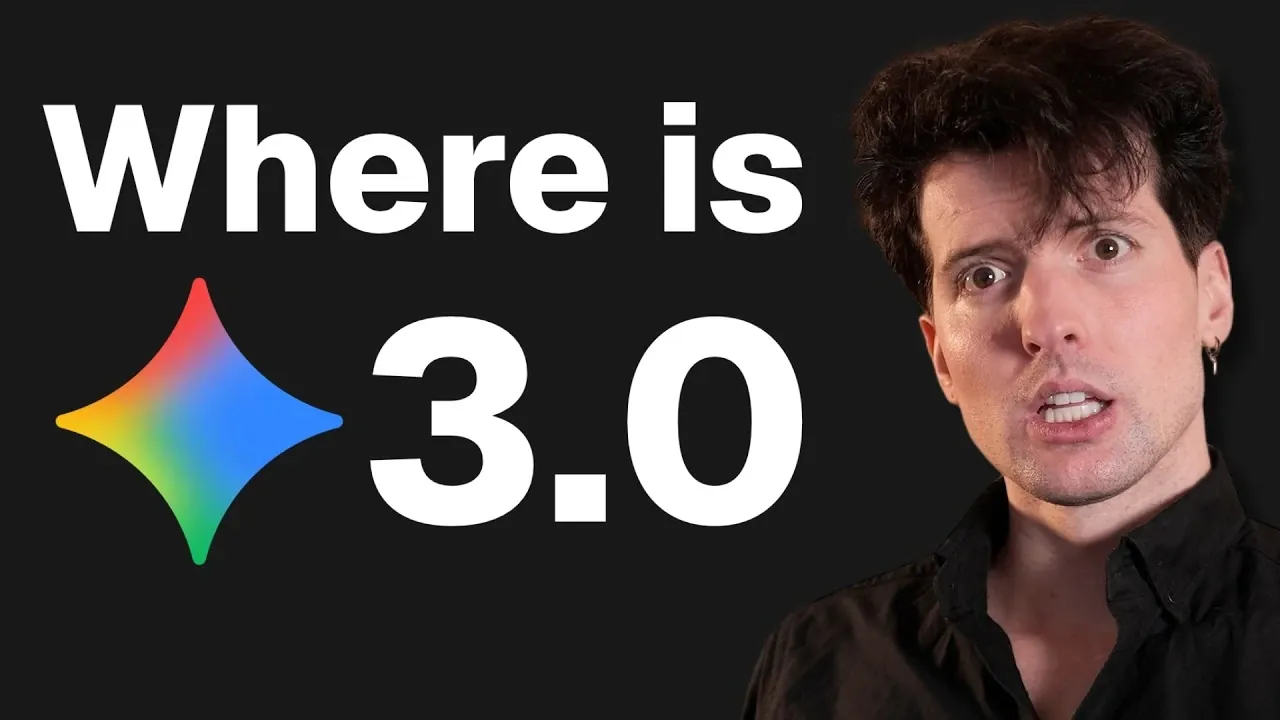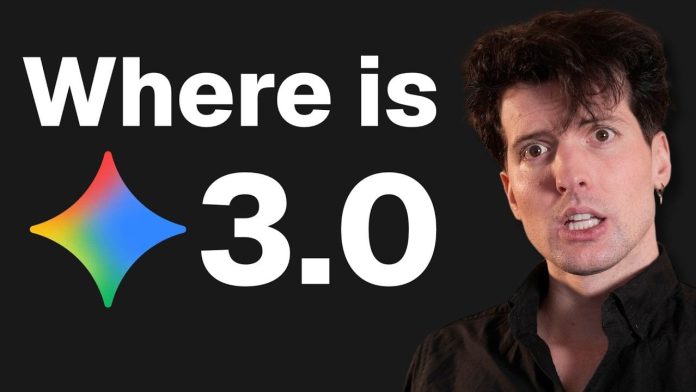
Where the f* is Gemini 3? It’s the question reverberating through the AI community, sparking frustration, speculation, and no small amount of intrigue. For months, Google has kept silent about the release of its highly anticipated Gemini 3 model*, leaving developers and enterprises in a state of limbo. Meanwhile, competitors like OpenAI and Anthropic have surged ahead, setting new benchmarks with GPT-4 and Claude 3, respectively. The stakes couldn’t be higher for Google, whose reputation as an AI leader now hinges on whether Gemini 3 can deliver a new leap, or risk being labeled a misstep. But why the delay? Is it perfectionism, internal discord, or something more strategic? The silence is deafening, and the industry is holding its breath.
Below Theo provides more insights into the tangled web of possibilities behind Gemini 3’s mysterious absence. From internal dynamics and competitive pressures to the broader implications for Google’s standing in the AI arms race, we’ll unpack the factors that might be slowing progress. Could it be that Google is playing a high-stakes game, prioritizing refinement over speed to avoid a public stumble? Or does this delay signal deeper challenges within its AI ecosystem? As we peel back the layers of this unfolding drama, one thing becomes clear: the story of Gemini 3 is about more than just a release date, it’s a window into the volatile, high-pressure world of innovative AI innovation.
Google Gemini 3 Delay
TL;DR Key Takeaways :
- Google’s much-anticipated Gemini 3 AI model remains unreleased, causing speculation and uncertainty within the AI community, as competitors like OpenAI and Anthropic continue to advance.
- The delay may stem from Google’s cautious approach to ensure Gemini 3 meets high industry expectations, but the lack of transparency risks alienating developers and enterprises relying on its AI ecosystem.
- Internal challenges, such as fragmentation among Google’s AI teams and the complexity of managing interconnected components, could be contributing to the delay.
- Google’s aggressive deprecation of older Gemini models without a clear timeline for Gemini 3 has left enterprises in a precarious position, highlighting the tension between innovation and stability.
- Speculation about limited access to early versions of Gemini 3 underscores the need for clearer communication from Google to manage expectations and maintain trust in its AI leadership.
Why the Silence? Speculation Surrounding the Delay
Months of rumors and leaks have done little to clarify the situation, as Google has yet to provide an official timeline for Gemini 3. This prolonged silence has created uncertainty for developers and enterprises that rely on Google’s AI ecosystem for innovation and operational efficiency. One possible explanation for the delay is that Google may be taking a cautious approach to avoid releasing a model that fails to meet the high expectations set by its competitors. By withholding Gemini 3 until it is fully refined, Google could be aiming to protect its reputation as a leader in AI development.
However, this lack of transparency comes with risks. Developers and enterprises that depend on Google’s AI tools may feel alienated or frustrated by the absence of clear communication. Without updates, users are left to speculate, which could erode trust in Google’s ability to deliver innovative solutions in a timely manner.
Rising Competition in a Rapidly Evolving Industry
The AI landscape has undergone rapid transformation in recent months, with competitors setting new benchmarks for performance and usability. OpenAI’s GPT-4 and Anthropic’s Claude 3 have demonstrated remarkable advancements, raising the bar for the entire industry. These developments may be influencing Google’s approach, as the company works to ensure that Gemini 3 can compete, or even surpass, these models in terms of functionality, accuracy, and user experience.
The stakes are particularly high in this competitive environment. A misstep could tarnish Google’s reputation as a pioneer in AI innovation, while a delayed release risks allowing competitors to solidify their dominance. Google’s challenge lies in balancing the need for speed with the imperative to deliver a product that meets the industry’s evolving standards.
When is the Gemini 3 Release Date?
Find more information on Google Gemini 3 by browsing our extensive range of articles, guides and tutorials.
Internal Dynamics: A Double-Edged Sword
Google’s AI development efforts are spread across multiple teams, including Google DeepMind, AI Studio, and Vertex AI. This vertical integration allows Google to oversee the entire AI pipeline, from research and development to deployment and application. While this structure offers significant advantages in terms of control and coordination, it also introduces challenges that may be contributing to the delay.
Fragmentation and conflicting priorities among these teams could be slowing progress. Aligning diverse groups under a unified vision for Gemini 3 may require significant effort, particularly when balancing short-term goals with long-term strategic objectives. Additionally, the complexity of managing interconnected components, such as hardware, software, and data infrastructure, further complicates the development process.
Deprecation of Older Models: A Risky Strategy
Google’s decision to aggressively deprecate older Gemini models, including Gemini 2.5, adds another layer of complexity to the situation. While this strategy signals a focus on future advancements, it also leaves enterprises that rely on these models in a precarious position. Without a clear timeline for Gemini 3, users face potential disruptions to their operations, which could undermine confidence in Google’s AI ecosystem.
This approach highlights the tension between innovation and stability. While pushing forward with new technologies is essential for maintaining a competitive edge, it must be balanced with the need to support existing users and ensure a smooth transition to newer models.
Rumors and Speculative Access
Unverified reports of limited access to Gemini 3 have surfaced, with some users claiming to have tested early versions of the model. These accounts suggest that development is ongoing, but they also underscore the lack of transparency surrounding the project. Without official confirmation or detailed updates from Google, such rumors do little to alleviate concerns about the delay.
The absence of clear communication leaves room for speculation, which can be both a distraction and a source of frustration for stakeholders. Transparent updates could help manage expectations and maintain trust, even if the release date remains uncertain.
Possible Reasons for the Delay
Several factors could be contributing to the postponement of Gemini 3’s release. These include:
- Benchmarking Concerns: Google may be striving to ensure that Gemini 3 outperforms competitors like GPT-4 and Claude 3, requiring extensive testing and refinement.
- Copyright Challenges: Legal and ethical scrutiny over the training data used for AI models could be slowing progress, as Google works to address potential compliance issues.
- Performance Prioritization: Achieving state-of-the-art results demands rigorous evaluation and optimization, which can extend development timelines.
Each of these factors highlights the complexity of developing a next-generation AI model in a highly competitive and rapidly evolving industry.
Broader Implications for Google and the AI Industry
The delay in Gemini 3’s release reflects the broader challenges of maintaining leadership in the AI sector. For Google, the stakes are particularly high. A rushed or underwhelming release could damage its reputation, while prolonged delays risk ceding market share to competitors. This situation underscores the difficulties of balancing innovation, competition, and strategic execution in an industry where advancements occur at an unprecedented pace.
At the same time, the delay offers a glimpse into the broader dynamics of AI development. From managing internal teams to navigating external pressures, companies like Google face a complex array of challenges as they work to push the boundaries of what AI can achieve. The outcome of this process will not only shape Google’s future but also influence the trajectory of the AI industry as a whole.
The Waiting Game: High Stakes and Uncertain Outcomes
The ongoing uncertainty surrounding Gemini 3’s release highlights the delicate balance Google must strike between innovation and execution. While the company’s vertical integration offers significant advantages, it also introduces challenges that may be contributing to the delay. As the AI community watches and waits, the stakes remain high. Whether Gemini 3 ultimately meets expectations will have far-reaching implications for Google’s role as a leader in AI and for the broader industry’s evolution. For now, the release of Gemini 3 remains one of the most closely watched developments in the world of artificial intelligence.
Media Credit: Theo – t3․gg
Filed Under: AI, Technology News, Top News
Latest Geeky Gadgets Deals
Disclosure: Some of our articles include affiliate links. If you buy something through one of these links, Geeky Gadgets may earn an affiliate commission. Learn about our Disclosure Policy.







